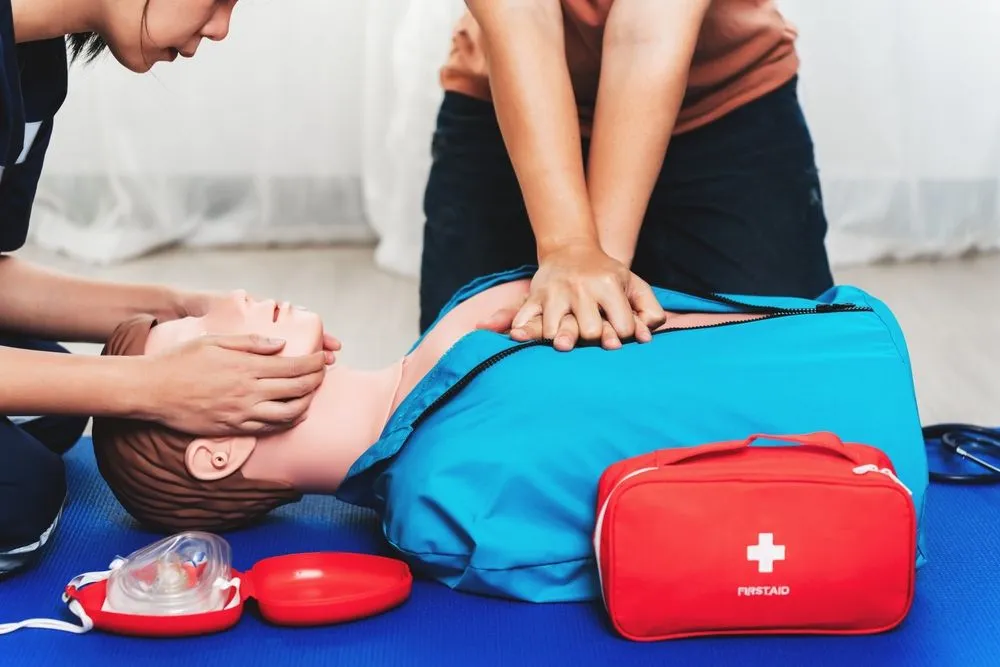Spinal injuries can be life-threatening, so knowing how to act quickly and correctly in an emergency is vital. Whether you’re at home, at work, or outdoors, this guide will walk you through the key first aid steps and how to spot the signs of a spinal injury to help prevent further damage.

What is a Spinal Injury?
Spinal injuries happen when the spine or spinal cord is damaged, and they may lead to serious issues like paralysis. Because these injuries often happen without warning and can cause lasting disability, it’s vital to act quickly and correctly to prevent further harm. In the event of a spinal injury, understanding the importance of first aid training could mean the difference between recovery and permanent disability, or even life and death.
Recognising the Symptoms of a Spinal Injury
Understanding what to look for in a potential spinal injury can help you respond more effectively. Below are some of the most common symptoms to be aware of in such situations.
- Neck or back pain or tenderness (especially in the spinal region).
- Difficulty moving limbs or inability to move.
- Numbness or loss of sensation in the arms, legs, or other body parts.
- Weakness or loss of coordination in the limbs.
- Paralysis (partial or complete, depending on the severity of the injury).
- Loss of bowel or bladder control.
- Breathing difficulties or trouble with respiration.
- Sharp or stinging pain in the neck or back.
- Muscle spasms in the back or limbs.
- Loss of consciousness or altered mental state (due to shock or head injury).
- Loss of sensation in the limbs.
- Deformity or abnormal positioning of the head, neck, or back.
- Unconsciousness or drowsiness.
Common Causes of Spinal Injury
Spinal injuries often result from sudden, forceful events that impact the spine or the structure surrounding the spine. The most common causes include:
- Falls: Especially from height, down stairs, or falling awkwardly during everyday activities. Older adults and people working at heights are particularly vulnerable.
- Road Traffic Accidents: High-speed collisions or sudden deceleration in a vehicle can cause severe spinal trauma.
- Motorcycle Accidents: Being thrown off or falling from a motorcycle frequently leads to back and spinal injuries, especially without proper protection.
- Sports Injuries: Contact and high-impact sports like rugby, diving, or horse riding can stress the spine significantly.
- Falling Objects: A heavy object hitting the back, every day in construction and warehouse settings, can result in spinal fractures or compression injuries.

Put Your First Aid Knowledge into Practice by enrolling in a course today! Our First Aid courses equip you to handle critical situations, including spinal injury management, and enhance workplace safety. Build confidence and expertise with Emergency First Aid at Work (EFAW) and Level 3 First Aid at Work meeting UK legal requirements.
Step-by-Step Guide: How to Give First Aid for a Suspected Spinal Injury
If you suspect someone has a spinal injury, giving the right first aid can make a big difference. Follow these step-by-step instructions to protect their spine and keep them safe until emergency help arrives.
Steps | Action | Details |
1 | Reassure and keep still. | Tell the casualty not to move unless there’s immediate danger. Call 999 or 112, or ask someone else to call. |
2 | Support the head and neck. | Kneel behind their head. Hold both sides of the head with fingers spread (don’t cover ears). Keep head, neck, and spine aligned. |
3 | Use rolled blankets for support | Ask a helper to place rolled blankets/towels on either side of the head to keep it steady in a neutral position. |
4 | Monitor breathing and responsiveness | Keep checking their breathing and level of response while waiting for emergency services. |
5 | Open the airway with the jaw thrust | Place fingertips at the jaw angles and gently lift the jaw to open the airway; do not tilt the neck. |
6 | Check breathing for 10 seconds | Look, listen, and feel for breathing by placing your ear near their mouth and looking down their body. |
7 | If breathing | Continue supporting the head and monitor their breathing and response until help arrives. |
8 | If not breathing | Confirm emergency call, start CPR immediately (if trained), and ask for a defibrillator (AED) if available. |
Recovery Position: When It’s the Only Option
In most cases of suspected spinal injury, the casualty should not be moved to avoid worsening the injury. However, if they’re unresponsive and not breathing normally, and you can’t maintain an open airway, you may need to place them in the recovery position. This involves gently rolling the person onto their side, keeping the head, neck, and spine aligned as much as possible, with the head tilted slightly to keep the airway open. In such emergencies, ensuring the casualty is breathing takes priority over spinal stability.
Simple Safety Measures to Avoid Spinal Injury
Preventing spinal injuries is about being mindful in everyday activities and making safe choices. Here are some simple steps you can take to protect your spine:
- Wear your seatbelt: Always buckle up, whether driving or riding in the car. It’s your first line of defence in a crash.
- Lift smart: When lifting heavy objects, bend your knees instead of your back. Keep the object close to your body and avoid twisting as you stand.
- Make your home fall-proof: Secure loose rugs, install handrails on stairs, and use non-slip mats in bathrooms to reduce the risk of falls.
- Stay active: Regular exercise helps strengthen your core muscles, supporting your spine. Even simple activities like walking or swimming will help keep your back healthy.
- Suit up for sports: Wear protective gear when playing or participating in recreational activities. Helmets and pads are essential in preventing serious injury.
- Think before you dive: Always check the water depth before diving. Avoid diving into shallow water to prevent spinal injuries.
- Keep kids safe: Ensure children use the appropriate car seats for their size and age, and always supervise them during rough play or at the playground.
Not sure where to start? This infographic summarises the top four ways to protect your spine daily.

Conclusion
Knowing the signs of a spinal injury and how to respond quickly can help prevent serious harm. First aid training gives you the confidence to act fast in emergencies, and that can save lives. Simple everyday habits like wearing a seatbelt, lifting safely, and staying active all help protect your spine. A little care now can make a big difference later.
Frequently Asked Questions
What is the recovery position?
The recovery position keeps the airway clear in someone who is unconscious but breathing. It involves gently rolling them onto their side with their head tilted back. If a spinal injury is suspected, only use it if absolutely necessary, such as if they’re vomiting or having trouble breathing. You’ll learn how to respond safely in situations like this in our First Aid at Work course.
What should you not do if someone has a spinal injury?
Don’t move them unless there’s an immediate danger. Avoid twisting their spine, removing helmets, or allowing them to sit up, stand, or walk, these actions could cause further harm.
What are the signs of a spinal injury?
Watch for neck or back pain, numbness, tingling, weakness, or difficulty moving limbs. Loss of sensation or control in the arms or legs can also be a sign. Always treat these symptoms seriously.
What should you know about spinal injury first aid?
Keep the person still, support their head and neck, and call 999. Only move them if they’re in danger or their airway is blocked. Reassure them and monitor their breathing until help arrives.
Explore Popular First Aid Courses at Hurak
Looking to boost your skills? Explore our range of first aid courses to find the right one for you.
Here are some of our most popular first aid courses to help you stay prepared:
- Emergency First Aid at Work (1 Day): A one-day course covering essential life-saving skills, including CPR, choking, bleeding control, and managing emergencies. Ideal for low-risk workplaces.
- First Aid at Work (3 Days): A comprehensive three-day training that prepares you to respond to a wide range of injuries and illnesses in the workplace. Meets HSE requirements for high-risk environments.
- Paediatric First Aid (2 Days): Designed for those working with infants and children. Covers child-specific emergencies like choking, febrile seizures, allergic reactions, and more.
- Basic First Aid Course: Perfect for general awareness. It covers basic skills like dealing with minor wounds, burns, shock, and fainting and is suitable for non-workplace settings.
- Advanced First Aid Training: Intended for those needing higher-level skills. Includes oxygen administration, advanced trauma management, and secondary assessments.
- First Aid for Mental Health: Focuses on identifying, understanding, and supporting individuals with mental health conditions. Covers stress, anxiety, depression, and early intervention strategies.






